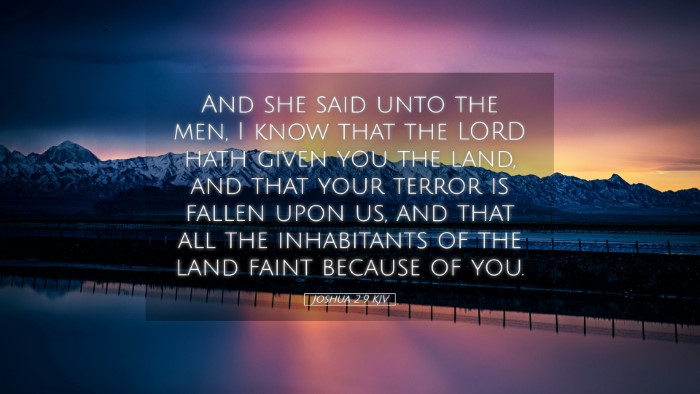Old Testament
Genesis Exodus Leviticus Numbers Deuteronomy Joshua Judges Ruth 1 Samuel 2 Samuel 1 Kings 2 Kings 1 Chronicles 2 Chronicles Ezra Nehemiah Esther Job Psalms Proverbs Ecclesiastes Song of Solomon Isaiah Jeremiah Lamentations Ezekiel Daniel Hosea Joel Amos Obadiah Jonah Micah Nahum Habakkuk Zephaniah Haggai Zechariah MalachiJoshua 2:9
Joshua 2:9 KJV
And she said unto the men, I know that the LORD hath given you the land, and that your terror is fallen upon us, and that all the inhabitants of the land faint because of you.
Joshua 2:9 Bible Commentary
Commentary on Joshua 2:9
Joshua 2:9 states, "And she said unto the men, I know that the LORD hath given you the land, and that your terror is fallen upon us, and that all the inhabitants of the land faint because of you." This verse marks a significant moment in the narrative of Israel's conquest of Canaan. Not only does it reveal the perception of the Israelites by their enemies, but it also highlights the divine sovereignty of God in the unfolding events of the Promised Land.
Contextual Background
Prior to discussing the specifics of the verse, it is essential to understand its context. This dramatic event occurs during the preparation stage of the Israelites to enter the Promised Land after their forty-year wilderness experience. Sending spies into Jericho indicates a strategic military approach that underscores the necessity of diligence in their mission (see Numbers 13-14 for God’s previous command concerning exploration).
Analysis of Key Themes
- Recognition of God’s Sovereignty:
Rahab's declaration, "I know that the LORD hath given you the land," illustrates her acknowledgment of God's hand in history. This statement reflects a deep understanding of Israel's destiny as ordained by Yahweh, an acknowledgment not commonly found among the Canaanites. This highlights the theme of divine sovereignty—God governs human affairs to accomplish His purposes.
- Fear and Dread:
Rahab mentions that "your terror is fallen upon us," showcasing the psychological warfare at play. The Canaanites' fear stems not merely from Israel's military capabilities but from Israel's God, whose reputation had spread far beyond the confines of their camp. Matthew Henry comments that fear of the LORD often causes individuals and nations to react in ways that reveal both their spiritual desperation and acknowledgment of divine power.
- Faith in Action:
Rahab's recognition of the Israelites' impending victory is not passive; it leads her to a decisive act of faith—hiding the spies and seeking protection for her family. This illustrates how true faith often compels action. Clarke notes that Rahab's faith positions her within the genealogy of Christ, demonstrating that faith is accessible irrespective of background, as long as it leads to submission to the will of God.
Theological Implications
The verse raises important theological implications regarding God's grace and inclusion of Gentiles in His redemptive plan. Despite being a Canaanite, Rahab's faith aligns her with God's people. This signifies that divine grace knows no boundaries, a theme echoed throughout Scripture, as evidenced in the New Testament with the inclusion of Gentiles in the plan of salvation (Romans 10:12-13).
Cultural Reflections
In the context of ancient Near Eastern cultures, the fear of an invading nation was a significant factor influencing the actions of individuals and city-states. Rahab's words reflect a society gripped by fear and deference to a greater power, which parallels many contemporary societal responses to perceived threats. The narrative asks modern readers to consider their own responses to God's working in their lives and the lives of others:
- Do we recognize the sovereignty of God in our circumstances?
- How do we respond to threats or challenges? Do we act in faith?
Conclusion
In summary, Joshua 2:9 serves as a powerful reminder of the profound impact of faith in God’s sovereignty. Rahab's actions reflect a pivotal junction where human fear meets divine providence. This ties into the broader biblical narrative focusing on God's redemptive purpose for humanity. As pastors, theologians, and scholars delve into this text, the emphasis should remain on God's ability to bring people from the margins into His fold, showcasing that faith, regardless of one's background, leads to divine favor and inclusion in God's eternal story.


